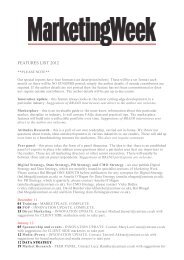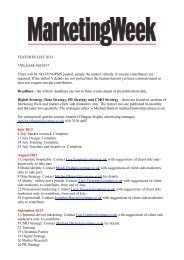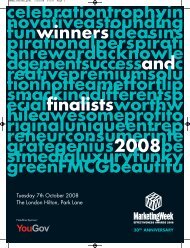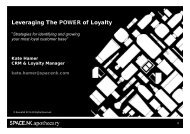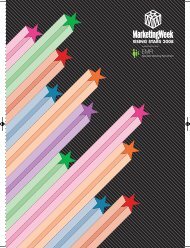Interactive Seven 2009 Supplement - Marketing Week
Interactive Seven 2009 Supplement - Marketing Week
Interactive Seven 2009 Supplement - Marketing Week
You also want an ePaper? Increase the reach of your titles
YUMPU automatically turns print PDFs into web optimized ePapers that Google loves.
MWIB_260209_p009 19/2/09 17:12 Page 9<br />
INTERACTIVE SEARCH<br />
“In the current<br />
economic climate, it<br />
is clear that<br />
marketing budgets<br />
will go down and<br />
even search budgets<br />
will be scrutinised.<br />
This magnifies the<br />
need for costefficient,<br />
highimpact<br />
marketing<br />
techniques”<br />
Mark Rabe, Yahoo! UK<br />
rebates to agencies depending on how much they spent with Google, has<br />
come to an end. Duncan Parry, co-founder at digital agency Steak, says:<br />
“The ending of Google Best Practice funding has caught some on the hop.<br />
Contracts will be up for negotiation and/or repitch, while some brands<br />
could consider recruiting search specialists to work in house.”<br />
Parry adds: “The most successful marketing campaigns will exploit the<br />
best of search, display, affiliates, mobile and email to build brand awareness,<br />
promote customer loyalty and acquire new customers, no matter what<br />
product or service is being sold. Managed display is an excellent way of<br />
positioning brands for the next upturn and has a positive halo effect on<br />
other online media, and search in particular.”<br />
Google agrees that search marketing should be seen as essential for any<br />
brand. Dan Cobley, Google director of marketing for UK, Ireland and<br />
Benelux, says: “With search marketing, businesses know precisely how<br />
much it costs to acquire a customer or drive them to an action. Search also<br />
allows businesses to focus very tightly on their highest margin products<br />
and services, to drive greatest profitability during tougher times. Enquiro<br />
and IPSOS research conducted this year found that presence on the Google<br />
search results page was able to lift brand metrics significantly.”<br />
Other advancements in the search marketing world have included the<br />
improved visibility offered to marketers from search companies through<br />
more advanced analytics. Chris Lewis, head of search at digital agency<br />
LBi, says: “With the launch of the Atlas Engagement Mapping approach,<br />
alongside similar products, marketers will have better visibility on whether<br />
search – specifically paid search – really is successful in its own right.”<br />
Understanding intent<br />
Microsoft Advertising commercial<br />
director Chris Ward agrees: “The<br />
ability to combine pay-per-click<br />
advertising with web analytics is an<br />
area which marketers should make<br />
the most of, as this provides an uplift<br />
in user engagement. Web analytics<br />
is about understanding your customer’s<br />
intent, and it allows marketers<br />
to understand more than just<br />
traffic or unique users.”<br />
According to search engine specialists<br />
bigmouthmedia, marketers will be looking to make campaigns more<br />
co-ordinated, both online and offline. Bigmouthmedia head of search<br />
Andrew Girdwood says: “As more companies seek a co-ordinated approach<br />
to their online marketing strategies, we expect to see increased demand<br />
for campaigns that integrate both paid and natural search strategies. Savvy<br />
clients will want to drive maximum value from digital campaigns by leveraging<br />
synergies wherever possible.”<br />
“Clients will expect more and more coordination of their online and<br />
offline marketing strands in <strong>2009</strong>, and in response the agencies will try and<br />
develop skill sets for both. This pressure will increase as demand to also<br />
co-ordinate affiliate marketing and internet display advertising campaigns<br />
proliferates, and as a result we’ll probably see more digital contracts leave<br />
the traditional agencies.”<br />
Positive outlook<br />
Looking ahead to the future, the search giants seem confident that the<br />
medium can survive the threat of the credit crunch. Microsoft’s Ward says:<br />
“Search will buck the overall marketing spend as it provides excellent<br />
return on investment (ROI) and visibility of results for marketers. There<br />
will be more innovation around the use and interpretation of data, and<br />
these will be driven further by the use of engagement mapping.”<br />
Engagement Mapping allows marketers to map and assign value to the<br />
various touch points a consumer is exposed to, which presents a more complete<br />
picture of a campaign. Yahoo!’s Rabe adds: “As the internet continues<br />
to open up to users and developers, more opportunities for search<br />
marketers are created to help them<br />
“Search marketers<br />
must demonstrate<br />
strong business<br />
understanding and<br />
apply this to... tight,<br />
strategic searchmarketing<br />
plans”<br />
Nigel Muir, DBD Media<br />
mould their marketing programmes,<br />
yet at the same time the<br />
content explosion poses specific<br />
challenges for marketers as they<br />
seek brand engagement. Content<br />
and interaction will only continue<br />
to grow, forcing marketers to rely<br />
on search marketing initiatives that<br />
are focused and tailored to grasp<br />
consumers’ attention.”<br />
Smaller search engine marketing<br />
agencies also feel positive about<br />
the future, despite Google’s deci- <br />
<strong>Marketing</strong> <strong>Week</strong> <strong>Interactive</strong> 9



